The ceremonies cost tens of millions of dong for the poor in the highlands of Nghe An
(Baonghean.vn) - Each ethnic group in the highlands has its own cultural characteristics in spiritual life, however many of their worship ceremonies are still heavily influenced by bad customs, costing tens of millions of dong.
Ky Son is home to many ethnic minorities such as Mong, Thai, Kho Mu. Each ethnic group is distributed in a certain area according to the village, commune and clan. This concentrated living has preserved valuable cultural features imbued with the identity of the ethnic groups. However, in a year, there are too many large and small ceremonies, causing many households to spend a large amount of money.
According to village elder Lau Xai Phia residing in Nam Khien 2 village (Nam Can commune), in his Mong ethnic community, each year there are households that organize 4-5 large and small ceremonies. That is not to mention other ceremonies that arise such as making offerings, naming children, naming sons-in-law...
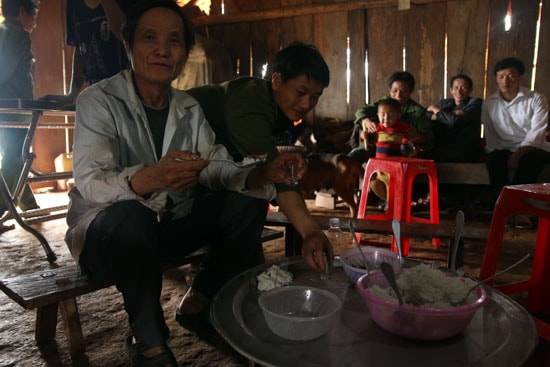 |
| The naming ceremony for the groom of the Mong people. Photo: Dao Tho |
Just for something as simple as a naming ceremony for a groom, many people who have just gotten married have to spend tens of millions to hold the ceremony. Mr. Xong Ba Thai, residing in Tham Hon village (Na Ngoi commune - Ky Son), just had his naming ceremony done by his maternal family and looked very excited.
Seeing our curiosity, he explained: “That’s how the Mong people are. When they are born, their parents give them a name, but after they get married, they have to invite their wife’s parents to give them a new name. This name will follow the Mong people for the rest of their lives.” Anyone who gets married but has not yet performed this ceremony is considered to be in debt to their maternal family. No matter how poor their family is, they still have to find a pig weighing about 150 kg along with other foods and invite the shaman and villagers to attend.
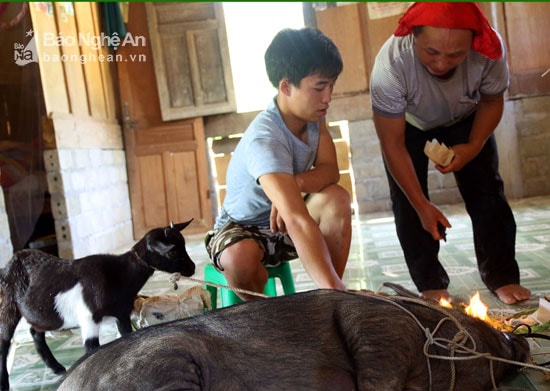 |
| A Mong people's ceremony with offerings of pigs and goats. Photo: Dao Tho |
Early in the morning, everyone in the village gathered to attend the naming ceremony for Xong Ba Thai. Young men butchered pigs, women prepared vegetables… it was extremely bustling. In the middle of the house, a village elder was performing a ceremony to ask for his descendants to be renamed. After a while, the name Xong Ba Thai was changed to Xong Rua Thai, everyone happily ate and drank to celebrate him until late at night before breaking up.
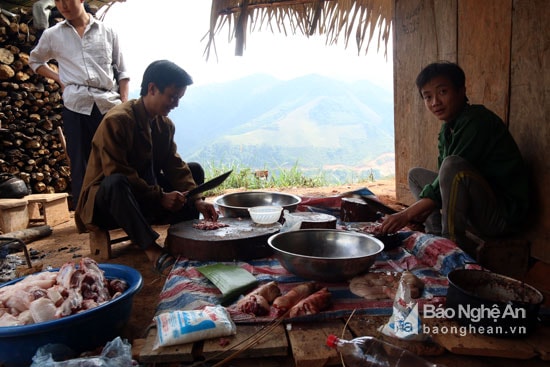 |
| Part of this food is given to the shaman, and part is invited by the homeowner to the villagers. Photo: Dao Tho |
According to Thai, his family was very poor so they had to save money for a long time, and after 3 years they were able to invite the wife's family to hold a naming ceremony. The cost this time was estimated to be tens of millions of dong. "I don't know if we will have to hold another ceremony this year, now the family has no money left" - the son-in-law said sadly.
In Khmu villages, sacrifices are also frequent and equally wasteful. One of the most wasteful ceremonies is the “buffalo eating” ceremony.
Mr. Xeo Pho Manh, residing in Cha Ca 1 village (Bao Thang commune), said: In the life of an adult man, he must once perform this ceremony for his ancestors. Whoever has not done it is considered as not having fulfilled his duty to his ancestors. Those who have not performed the "buffalo eating" ceremony, the ancestors can "remind" them by creating something strange that causes the breadwinner of the family to encounter. For example, he may see a snake or a pangolin crawling in a field fire. The fire is burning fiercely but it is still living normally. The Khmu people here believe that it is the ancestors returning to bring bad omens, so they immediately go to a shaman to "see" for help. If the shaman says: "parents come back to eat buffalo", then that family must organize a buffalo sacrifice ceremony as soon as possible. This is an expensive ceremony, so not every family can do it. Therefore, it takes a long time to prepare.
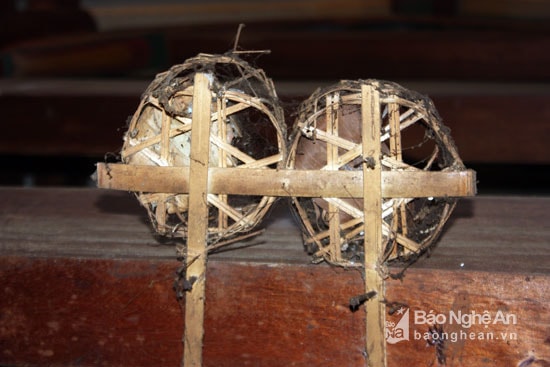 |
| The Then used in the "buffalo eating" ceremony of the Khmu people. Photo: Dao Tho |
Whether it takes one or several years to prepare, the buffalo sacrifice ceremony must eventually take place. People believe that the "buffalo eating" ceremony is to thank grandparents and parents who directly raised us. In addition to ancestors, the gods, the Thens in heaven, also take part in the buffalo eating ceremony. According to Mr. Xeo Pho Manh, the Thens are also the ones who give birth to, nurture and protect us from birth until death. That is when people have finished their duties in the human world and the Thens call them back to the Heavenly world.
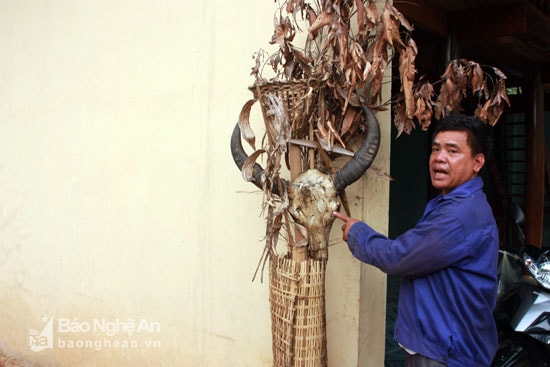 |
| The buffalo head was kept after the "buffalo eating" ceremony. Photo: Dao Tho |
The “buffalo eating” ceremony must be held on the death anniversary of the deceased who was the breadwinner of the family, the father or grandfather of the homeowner for example. For the Khmu people in Bao Thang, the death anniversary is also a day of abstinence. On that day, people take a break from work, go to the fields, go to the forest and do other economic activities. If they go out of the house, they must not close the main door because it is believed that if the door is closed, the ghost of the house will not be able to come back to eat the death anniversary. Of course, the day of the “buffalo eating” ceremony is also a sacred day.
Preparing for the “buffalo eating” ceremony is a feat. First, a buffalo for sacrifice is raised and waiting by the homeowner. Those who do not have a buffalo must buy one. As for the Cut family in Ca Da village (Bao Thang - Ky Son), they sacrifice a cow instead of a buffalo.
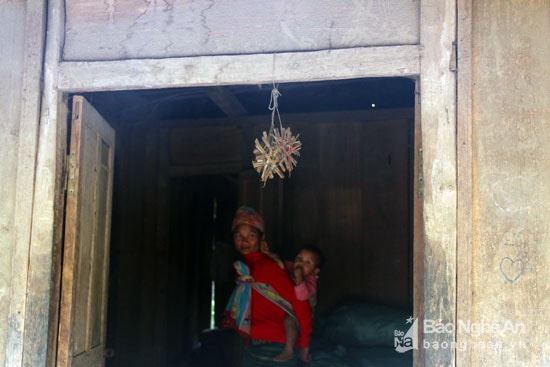 |
| The taboo symbol of the Khmu people when there is a ceremony in the house. Photo: Dao Tho |
Mr. Xeo Pho Manh shared that: To hold a buffalo eating ceremony is very expensive, especially in the current economic conditions, a buffalo for the ceremony costs about 20 million VND. However, because of the "responsibility" to the ancestors and the Then, the Khmu men from adulthood to old age must organize it at least once. That is why some families have become poorer after the "buffalo eating" ceremony.
It is clear that life is becoming more and more modern, but costly rituals with many superstitious elements still exist in poor highland villages. We think that these factors need to be overcome soon to make the culture "cleaner"./.
Dao Tho
| RELATED NEWS |
|---|

